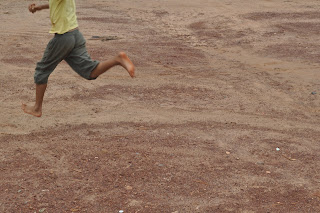 One of the key facets of business, especially when dealing with clients, is effectively managing expectations. This is one of the most critical skills I first learned when I started working. Setting and managing expectations is a powerful tool that can drastically alter satisfaction and perception of you as a professional.
One of the key facets of business, especially when dealing with clients, is effectively managing expectations. This is one of the most critical skills I first learned when I started working. Setting and managing expectations is a powerful tool that can drastically alter satisfaction and perception of you as a professional.Sometimes I have noticed, while working in Hubli, the inability to set or manage expectations. As I sit here typing this blog post, the Innovator’s residence, the Scholars House, has been without water and power since Saturday night. It is currently Monday, in the early afternoon. We are use to power outages so when the lights went out late Saturday night, I assumed that everything would be in working order the next morning. But no power and no water followed on Sunday and continue to be missing today. Obviously, this is annoying. However, this would have been more bearable if we were given notice for the reason for this interruption. Apparently, a new power generator is being installed and water needed to be refilled at the Scholars House. Yet, none of us were told that this work would be done this weekend and that there would be a period of time when we would not have access to current or water. A little notification would have altered my expectations and I would have been adequately prepared for the minor service interruption. However, due to the lack of setting of expectations, it has created more disgruntled feelings at the moment.
Specifically with SendHealth, expectations continue to play a critical role in the progression of our project. As we have known since the beginning, finding physicians to participate in our program is essential to making SendHealth function to the benefit of the villagers. We have been told by our partner NGO on three separate occasions that: 1) they would find a physician for us, 2) for us to reach out to physicians, and 3) again, that they would find a SendHealth physician. This time, KHPT guaranteed they would find a physician.
To complicate matters, during our search, we spoke with numerous physicians who all reached the same conclusion: that SendHealth will not work. They cited litigation issues, incentive questions, and issues with physicians being overworked. We appreciated the physicians honest and clear feedback and were grateful for their willingness to assist us in any other way possible. They admired our enthusiasm and wish to make a difference. However, this still does not change the fact that all the physicians we spoke with commented that connecting physicians with patients over mobile phones would not work. Instead, most recommended for us to focus on health awareness and education.
Who to believe? What will happen to our project? For the first time, I am worried that our project is suddenly derailed in our last week in Hubli. And not for the first time, I believe honest feedback about gaining physician buy-in to participate in our project would have helped us to change course and appropriately adjust our project. However, at this point in time, we need to continue the course and leave it up to KHPT to find a participant physician. Setting and managing expectations would have made a significant difference.
Nonetheless, the responsibility lies on us to understand how to work effectively in a different culture while still generating positive and substantial results. I am still confident we will leave impacting a number of lives and that KHPT will utilize our program to best reach those most in need. Expectations or not, the show must go on.
One week left. 2 months zipped by.
Ken



 India is confusing: strikingly gorgeous landscape, architecture, and people intermingled with sometimes curious smells, poverty, and beggars. This is indeed a land of extremes in every sense of the word. One moment, it inspires you and delightfully heightens your senses; the next moment, it drives you to madness and exhaustion.
India is confusing: strikingly gorgeous landscape, architecture, and people intermingled with sometimes curious smells, poverty, and beggars. This is indeed a land of extremes in every sense of the word. One moment, it inspires you and delightfully heightens your senses; the next moment, it drives you to madness and exhaustion. At the other end of the spectrum are the multitudes of people I have interacted with who have been gracious, giving, kind, and welcoming. I am continually amazed at how any one of us can contact a stranger who will go out of his/her way to help us with our requests. They will become champions of our projects, escort us around various Taluks, and feed us delectable food and drink until we burst. When contacting people I have never met in the States, it is rare to find this type of openness and honesty from strangers: here in India, it's commonplace.
At the other end of the spectrum are the multitudes of people I have interacted with who have been gracious, giving, kind, and welcoming. I am continually amazed at how any one of us can contact a stranger who will go out of his/her way to help us with our requests. They will become champions of our projects, escort us around various Taluks, and feed us delectable food and drink until we burst. When contacting people I have never met in the States, it is rare to find this type of openness and honesty from strangers: here in India, it's commonplace.

 Deshpande Center for Social Entrepreneurship located on the campus of BVB College.
Deshpande Center for Social Entrepreneurship located on the campus of BVB College.
